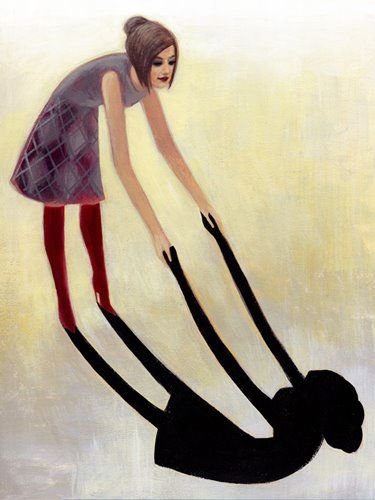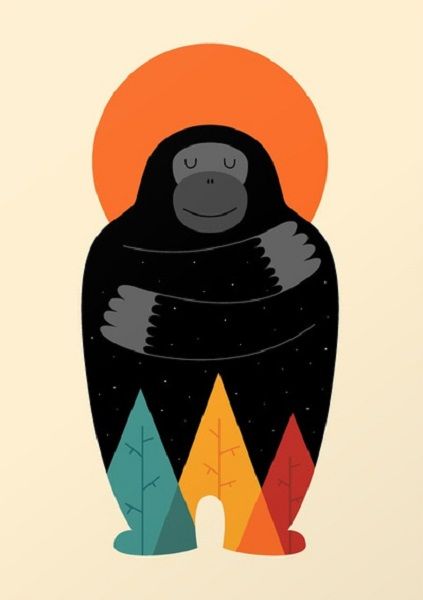The narcissism is a attachment to the fake image you have created for yourself. The word comes from the Greek myth of young Narcissus, who fall in love with his reflection on the surface of a river. He was so intrusive in his image that he didn't move and died there, staring at his mirror image. The western culture imposes the narcissism. We are influenced by the media to like the fake images of celebrities and to be obsessed with our appearance (which in turn sells fashion, beauty products, cosmetic procedures and operations, fitness salons). We rely on the need to admire what we look like, but unfortunately the more effort we make to build an image for the world, the more we move away from our true self. We are accustomed to all the cultivation books to hear the phrase: "You must love yourself before you are able to love others". It is very often misplaced by pseudo-experts and eagerly absorbed by the naive audience. The self we must love to heal, grow and change is not the superficial false self.
To fall in love with ourselves in the face of the world is misleading and ends unsuccessfully. Healing and growth comes through the belief of our true nature, that which is fraught with deficiencies and vulnerability, that we hide from others. In theology, this is our sinful nature, which has made mistakes and has failed. Therapy is called a wounded child, which brings the whole pain of life. We need to recognize our true nature to heal and grow. Good therapy should lead the client under the surface to the inside of the psyche to connect with childhood memories. All emotions and beliefs about the rest of us and the lives we have come from the past. If the opposite of love is hatred (some claim to be indifference), this hatred is based on projection. We have negative feelings towards people who have the negative traits we don't like. Therefore, if I learn to accept these negative aspects of my personality, we will accept them in other people. Negative feelings for others may be based on transfer (when important people who have been present in our lives, such as parents, brothers and sisters, have hurt us in childhood). The hate to someone may be simply a consequence of someone 's unpleasant attitude or incompatibility in our characters. Certainly negative feelings for some people are a normal defense reaction when they cause us anxiety. If an adult is angry and hates his partner, we associate with the child in the therapy that was angry and angry with his mother and father. The deeper we enter, we find the wrong beliefs related to the Self (the children are narcissistic in their underdeveloped thinking). If the child feels unusual, neglected or harassed by the parent, he blames himself and locks: Something wrong with me, I'm not good enough, I do not deserve love. So the wounded ego, with all its distorted negative beliefs, needs love to heal and unleash its ability to love others. In therapy, unconscious misconceptions about one's own personality are mitigated. The injured inner child is cared for and guarded. But what is meant by love? There are different types of love like romantic, family and spiritual love. Let's first explore emotions that are NOT love. There are four major negative emotions that have varying degrees of intensity:
The fear can manifest itself as mild anxiety, anxiety, nervousness and anxiety to panic and horror. Fear relates to the future, related to safety and survival, and is triggered by brain activity when we face threatening situations. Fear stems from the head as a thought process. When someone feels chronic fatigue, especially if he feels his partner as a threat, it is difficult to experience love. He is defensive and strenuous all the time. The sorrow of sorrow and sorrow is thought to be related to the heartbeat, and comes in response to loss or uncontrollable emotional needs. Sorrow, like other emotions, has different levels of manifestation - from a little disappointment to devastating experiences when your heart is broken and when you are completely desperate (lost hope and motivation for life). The sorrow also feels like physical pain in the heart because of the nerves and hormones that activate in the heartbeat. Sorrow is related to the past, it is the longing for something you have or want, but you have lost or it is over. When someone experiences the loss of a loved one or some trauma, it is useful to express his sadness with crying. When the grief remains depressed, the person loses the connection with his inner pain. It is clear that it is difficult to feel affectionate to yourself and others when you are buried in your own chronic, depressing sadness that sometimes grows into depression. But the man who expresses his sorrow with tears will come out of the process purified and capable of loving again. Feeling someone's inner pain is a path to true love. The shame is an emotion that is experienced in the stomach area. It comes from the established survival mechanism to recognize the good and the bad, what is beneficial to health or threatens it, in a moral and physical sense. If we eat food that is spoiled and can hurt us, we will feel nausea and spit it out. If we do something wrong, against our values, we will feel guilty. If we fix the behavior, feeling must disappear. However, some children feel guilty, bad about themselves, and temporary guilt becomes a constant shame - the child grows and continues to feel a bad person. Permanent shame can lead to any sort of shameful and harmful behavior, as man is self-indicating because he was bad and unworthy. Anger is an emotion that is felt in the abdomen, low down. It is intended to provoke action, struggle if your survival is threatened. Anger occurs when you defend yourself from an attack or insult. It may turn into a moment of revenge and retaliation if the insult is in the past. Anger also has variations from frustration to irritation, disrespect and contempt, from blinded hatred to furious anger. Suppressed anger manifests itself as hostility and outrage. In the relationship, if one of the two partners experiences indignation that does not express it, it is transformed into a lack of co-operation, concealed hostility and passive aggression. If someone lives in a state of prolonged anger, it is difficult for him to feel love and soothe his feelings because he is often overwhelmed by aggression hormones.
All these emotions are inherent in man and serve a particular purpose. But to become a loving person, you have to master these emotions and transform them into a positive, spiritual form. Fear can lead you to faith. Sorrow is the path to exalted love, such as compassion. Shame is overcome when you begin to feel good, and the energy that separates you from anger can become a motivator, an essence of hope. You need to feel your inner pain, all the depressed sorrow for not being loved enough, being mistreated and experiencing pain in your life. The feeling of sadness leads to empathy - the ability to share the pain of others. Empathy is a way to remorse about how we are hurting others and the desire not to hurt again. Compassion is a sense of deep concern, kindness, empathy and understanding. Compassion is spiritual love - it is unconditional and generous, does not require reciprocity. This is God's love expressed in men. Compassion is this healing love that the inner I need. When we feel ashamed of past mistakes, we start to fear three major reactions from people if they understand our transgressions - condemnation and reproach, which creates shame, rejection and interruption of relationships and anger and hatred. The opposite of these reactions is non-judgment - seeing goodness in man; forgiveness (forgive without punishing); acceptance instead of rejection and compassion instead of anger and hatred. The child or the elderly, ashamed of shame, can be cured using these methods. The inner self needs goodness, acceptance, and compassion. How can we give ourselves love? People are social beings and learn how to relate to themselves as others relate to them. As adults in search of healing, we need to feel love from others again, to feel accepted, valuable, and to feel the compassion of others through the eyes of love - acceptance, forgiveness, kindness, respect, kindness, and understanding. Compassionate people need us on the path to self-love. Who are these beloved people? Your task is to find them. And also to be that loving person who will help others to heal.



The truth is, the human anatomy at times is complicatingly ironical, most times people torture themselves drown in all kinds of pathetic emotions, when they could have just loved themselves.
Beautiful post here.👏👏👏👏
Downvoting a post can decrease pending rewards and make it less visible. Common reasons:
Submit
Yes, you are right... It is so simple to love themselfes, but really difficult to be accomplished :)
Downvoting a post can decrease pending rewards and make it less visible. Common reasons:
Submit
I enjoyed reading im following you instantly because i share you views
Downvoting a post can decrease pending rewards and make it less visible. Common reasons:
Submit
I enjoyed reading your post. There is a lot of good stuff.
Downvoting a post can decrease pending rewards and make it less visible. Common reasons:
Submit
Thank you :)
Downvoting a post can decrease pending rewards and make it less visible. Common reasons:
Submit
You are welcome @godflesh, I have a new post, do not forget to visit ya, let me add the spirit in steemit.
Downvoting a post can decrease pending rewards and make it less visible. Common reasons:
Submit
Hehe, sure :)
Downvoting a post can decrease pending rewards and make it less visible. Common reasons:
Submit
Great post @godflesh
Downvoting a post can decrease pending rewards and make it less visible. Common reasons:
Submit
Thanks :)
Downvoting a post can decrease pending rewards and make it less visible. Common reasons:
Submit
That a lot afford writing this great post.
Nice post here.
Downvoting a post can decrease pending rewards and make it less visible. Common reasons:
Submit
Thank you very much :)
Downvoting a post can decrease pending rewards and make it less visible. Common reasons:
Submit
Brilliant, mate.
Downvoting a post can decrease pending rewards and make it less visible. Common reasons:
Submit
Thanks :)
Downvoting a post can decrease pending rewards and make it less visible. Common reasons:
Submit
Reading this article goes along with my list of all the beneficial things that help me smash this load of bricks out of my gut and enjoy life without letting shame, fear, resentment and sorrow control my life. And I mean it.
Meditation.
Creation.
Healthy diet.
hanging out with Friends.
Chakra healing.
Tantric sex.
Semen retention.
Drinking water.
Reading this article.
Thank you!
Downvoting a post can decrease pending rewards and make it less visible. Common reasons:
Submit
very nice!
Downvoting a post can decrease pending rewards and make it less visible. Common reasons:
Submit
This is a great article on emotional intelligence. Clarified a few things for me. I spend so much time in solitude (which, for the most part, I prefer) that I forget to let others in. If we didn't need others, there probably wouldn't be the appearance of others.
Thank you.
Downvoting a post can decrease pending rewards and make it less visible. Common reasons:
Submit
Thank you too :)
Downvoting a post can decrease pending rewards and make it less visible. Common reasons:
Submit